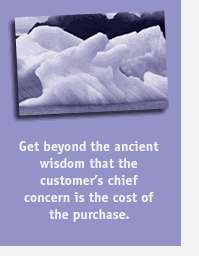
The Bulk of the Iceberg
| Продажи | ||||
| Sales.com | ||||
| Assessing... | ||||
by Graham Denton
Ancient wisdom says that what most buyers want is a good product or service at a good price. But "good," when it comes to price, often translates as "low," and the seller who fails to question that easy translation can end up shaving his company's profit and his commission. Usually this happens because the seller has bought the equally ancient wisdom that the every buyer's foremost need is to keep the price down.
 That
sounds sensible enough-it even sounds like Economics 101-but it's misleading.
Gary Karrass, who has run hundreds of Effective Sales Negotiating Seminars,
explains why in his book Negotiate to Close. Sure, he says, customers
want to pay as little as they can. But in making purchase decisions, price
is generally only the tip of the iceberg. The bulk of the iceberg is "a
constellation of human wants and needs" that can be defined as psychological
"satisfiers." If you provide the customer these satisfiers, price often
melts away.
That
sounds sensible enough-it even sounds like Economics 101-but it's misleading.
Gary Karrass, who has run hundreds of Effective Sales Negotiating Seminars,
explains why in his book Negotiate to Close. Sure, he says, customers
want to pay as little as they can. But in making purchase decisions, price
is generally only the tip of the iceberg. The bulk of the iceberg is "a
constellation of human wants and needs" that can be defined as psychological
"satisfiers." If you provide the customer these satisfiers, price often
melts away.
To summarize Karrass's main points, even the most price-conscious buyer also wants:
- To avoid risk, trouble, and unnecessary work. This is why people lean toward branded firms, even when their price is significantly higher than the competition's.
- To get it over with. Buyers will pay your premium price in an instant "if doing business with you is simply faster and more efficient than doing business with others."
- To add to his or her knowledge. Whatever you can share with a customer that will help him or her do a job better, the more likely price will be a diminishing factor.
- To feel that you're not boxing him in. This is important especially when you're announcing price increases. Do it in person, not by form letter, and explain the rationale.
- To be listened to. And listened to especially regarding the customers' ongoing business concerns. Do you understand how they look at the world? And do they know that?
- To achieve peace of mind. It would be hard to overestimate the importance of this last point. Customers buy product, yes, but they also buy satisfiers, and there is no satisfier more_well, satisfying than the feeling of confidence you get with a good purchasing decision.
So when you're negotiating price with a customer, think of that iceberg. Or think, alternatively, of an itemized contract, with every element of your arrangement clearly spelled out. That contract in a sense resembles the iceberg: What isn't on it may be more important than what is. Karrass makes the point well, in summing up his "satisfiers." "You've never seen a purchase order that included 'one pound of security,' 'two pounds of reliability,' 'three pounds of ego,' 'four pounds of trust,' but these and all the other satisfiers are part and parcel of every purchase order ever written."